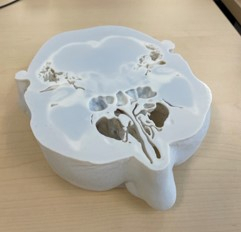por
John R. Fischer, Senior Reporter | November 28, 2023

Siemens Healthineers and Stratasys will develop phantoms tailored to individual patient-specific body parts for CT scanning assessments.
As part of a new research project, Siemens Healthineers and Stratasys are teaming up to design state-of-the-art phantoms tailored to match patient-specific anatomical body parts to help clinicians more accurately calibrate CT scanning and dose distribution for individuals.
By simulating certain human body characteristics, phantoms allow clinicians to test dose and image quality, accurately calibrate scanners, and keep performance consistent. Both companies will start out creating phantoms for the head and neck region and eventually produce ones for progressively larger and more complex anatomies, with the end Phase One goal being to 3D-print a heart model and an entire human torso with complete radiographic accuracy.
For the project, Stratasys will use its PolyJet technology for 3D printing and its RadioMatrix technology to create medical models with radio-realistic features. Siemens Healthineers will leverage its advanced algorithm to use data from scanned patient images to create specific material characteristics with radiopacity of human anatomy.




Ad Statistics
Times Displayed: 29715
Times Visited: 727 Stay up to date with the latest training to fix, troubleshoot, and maintain your critical care devices. GE HealthCare offers multiple training formats to empower teams and expand knowledge, saving you time and money
“The current limitations of imaging phantoms have been a longstanding challenge for the radiology community. This partnership with Siemens Healthineers will enable us to jointly explore the vast possibilities of our radiopaque materials and 3D printing technologies to overcome these barriers,” said Erez Ben Zvi, vice president medical at Stratasys, in a statement.
Here are two ways that Siemens Healthineers and Stratasys say their phantoms will address flaws in phantom development:
- Will replace human cadavers: In certain cases, manufacturers and academic providers can use phantoms in place of human cadavers, reducing human variability.
- Improve CT algorithms: The two will produce research data that will be used for this purpose, as well as for increasing materials development and identifying potential new application areas and future research opportunities.

